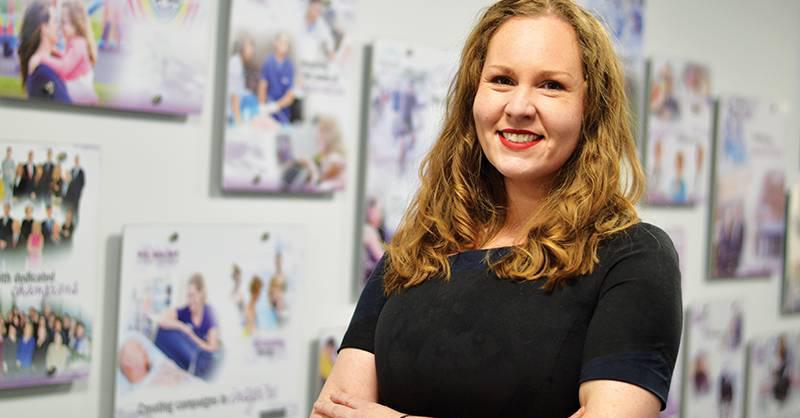
Jennifer Lane received a 2019 Diversity in Health Care Bursary, funded by the QEII Foundation. Jennifer is pursuing a PhD in nursing, with her research focused on the gap between the health services needed versus the health services offered for 2SLGBTQ populations.
Originally published on QE2Times.ca.
“Often when people look at me, they don’t see me as diverse. It makes me feel invisible,” says Jennifer Lane. “As a lesbian, stigma is harmful to my existence, but it also gives me a unique platform to speak from.”
Jennifer was one of 25 recipients of the 2019 Diversity in Health Care Bursaries, funded by the QEII Foundation in partnership with the Nova Scotia Health Authority and Community Health Boards.
The Diversity in Health Care Bursaries, at $1,000 each, help make a difference for post-secondary students from diverse backgrounds who are pursuing a career in a healthcare field.
With an increasingly diverse population in Atlantic Canada, there is a need to have accessible health care for all — and accessibility includes having caring healthcare teams that understand different cultures and languages, to provide the best patient care.
“It’s important to us — and to our donors — that the QEII Health Sciences Centre reflects the many communities we serve; to ensure equal opportunity and access to training and education,” says Julie MacKean, vice-president of philanthropy at the QEII Foundation. “We want to help create a future with a vibrant work environment dedicated to improving and, in many cases, saving the lives of patients.”
For Jennifer, this means being part of the change. As a graduate student and registered nurse, her interest lies in shedding a light on the gaps in knowledge that pertain to 2SLGBTQ health concerns.
“It is a great privilege to be able to do the work that I do,” says Jennifer. “And as a nurse, I have a duty to do this work.”
Jennifer is referring to her ongoing work and research as she works toward her PhD in nursing. The lack of knowledge and current training on 2SLGBTQ health is what drives her.
“I have an interest in the gap between the health services needed versus the health services offered for 2SLGBTQ populations,” says Jennifer. “And 2SLGBTQ patients are often expected to close that gap, sometimes missing out on the care they need.”
She gives the example of common questions female patients are asked during a health assessment: Are you sexually active? Or is there a chance you could be pregnant?
For lesbians, answering “yes” to being sexually active doesn’t mean they have a risk of pregnancy. The same goes for a trans woman, who can’t get pregnant because she doesn’t have a uterus. The standard method of questioning forces them to reveal a part of their identity or risk not receiving the best care.
“Trans patients are a particularly disadvantaged group because there is very little education done on the impacts of medicalizing trans bodies,” she says. “If a patient wants testosterone treatments and their physician doesn’t know how to prescribe it, where do they go from there?”
As a mental health nurse, who still works casual shifts at the QEII’s Abbie J. Lane building while pursuing her PhD, Jennifer is focused on the therapeutic relationship with patients and assessing for vulnerabilities. She notes the importance of using neutral language when speaking with patients.
“If I use neutral language, then the patient will use language that reflects their lived reality,” Jennifer says. “I can reflect that language back to them, validating them as a person.”
Part of Jennifer’s research focuses on healthcare professionals understanding their own cultural biases when interacting with someone from a different culture — and what kind of blind spots they may have. These blind spots translate into unmet healthcare needs.
“If I’m not trained to see my blind spots, I don’t know what I’m not seeing and, thus, not addressing,” she says. “It’s really about seeing the whole person.”
"It’s the first time I’ve been recognized for being diverse and, for me, that’s a very powerful acknowledgement."
– Jennifer Lane
Jennifer says it’s about teaching healthcare professionals how to be the experts on health, but interacting with patients in a way that the patient feels they are the expert on themselves.
As a course professor in exploratory nursing practice this past semester at Dalhousie University’s School of Nursing, Jennifer was able to teach these skills to her class of 66 students. Having an incredible experience as a new educator, Jennifer says working with the students has been an honour.
“To be in a position when I can influence the way nursing students understand these issues fills me with hope for the future,” she says passionately. “They’ll graduate in May and will go out in the healthcare world with this knowledge. Imagine how many patients they’re going to see throughout their careers.”
Jennifer is grateful for receiving the Diversity in Health Care Bursary. Not only is the financial assistance needed and appreciated, but it’s an important step in the progression of health care in Nova Scotia.
“I think NSHA and the QEII Foundation are doing something very important with this diversity bursary,” says Jennifer. “It’s the first time I’ve been recognized for being diverse and, for me, that’s a very powerful acknowledgement.”
Click here to learn more about our Diversity in Health Care Bursary program.